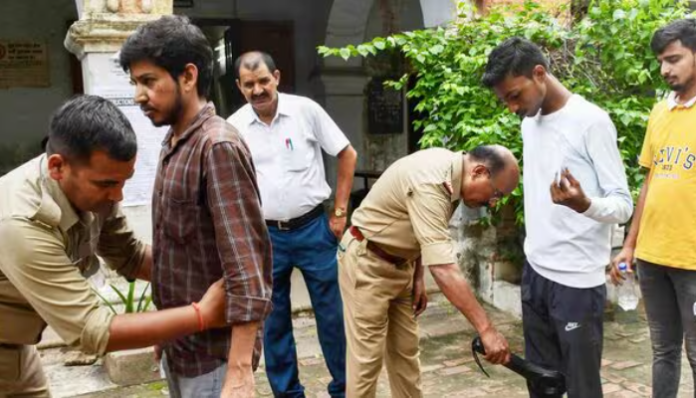On April 16th, a disturbing incident unfolded at Aadichunchanagiri Independent PU College in Shivamogga, Karnataka — a state governed by the Congress party. Students appearing for the Common Entrance Test (CET) were reportedly subjected to religious humiliation. Security personnel at the exam center allegedly forced Hindu students to remove their sacred threads, known as “Janivara”, before allowing them to enter the premises.
The incident sparked outrage among the Brahmin community, which has strongly condemned the act and demanded accountability from the authorities for violating the sanctity of their religious symbols. The forceful removal of a sacred thread something deeply symbolic and integral to Hindu identity was seen not only as an insult but also as a direct assault on religious freedom.
The next day, on April 17th, representatives of the Bhramina Sanghagala Okkuta, led by former MLA K.B. Prasanna Kumar, formally lodged a complaint with Deputy Commissioner Gurudatta Hegade. According to the complaint, CET officials and security staff compelled students to remove not just the janivara but also the “Kashidara”, a holy wrist thread.
Kumar revealed that of the three students targeted at the center, only one resisted and was eventually allowed to enter the exam hall without removing his sacred thread. The others, who complied under pressure, had their Janivara disgracefully tossed into a dustbin by the security staff. “We strongly condemn this insult,” Kumar told Deccan Herald, demanding that the staff be punished and that such egregious behavior never be repeated.
The students were reportedly shaken and traumatized. As representatives of the community emphasized, the CET is a life-defining exam — and to be subjected to religious harassment on such a crucial day can have lasting psychological effects. “The officer’s actions were completely unwarranted and blatantly disrespectful of Hindu customs,” Kumar said.
Deputy Commissioner Gurudatta Hegade has promised to look into the matter and obtain a report within a week. He also instructed officials to avoid such misconduct in the future. However, instead of offering an apology or clear accountability, authorities seemed to deflect the blame. Hegade told Times of India that there were “no additional restrictions” imposed and claimed the students were simply following the KEA-prescribed dress code. Siddalinga Reddy, Additional Deputy Commissioner of Shivamogga, went a step further by denying the allegations altogether — a statement that only added fuel to the fire.
Reports indicate that the controversy began when a home guard, tasked with security, overstepped his authority and began aggressively enforcing the dress code, going as far as to demand the removal of Rudraksha, Janivara, and Kashidara from students. While some students gave in quietly, one brave student voiced his protest and alerted his parents. According to Congress leader HC Yogesh, similar incidents were reported from another CET center, an engineering college in Shivamogga, where candidates were again instructed to remove religious threads.
Members of the Brahmin community, led by S. Dattatri (BJP) and K.B. Prasanna Kumar, staged a protest outside the college. Police were deployed to disperse the crowd and maintain order during the exam on April 17th, which ultimately concluded without incident.
Pattern of Targeting: This Isn’t an Isolated Case
Sadly, this is not the first time Hindu students have been targeted for their faith under the guise of examination protocol. There is a disturbing pattern emerging across states where students from the Brahmin community are repeatedly being told to discard their sacred threads.
- February, Rajasthan: Two Brahmin candidates were allowed to enter the REET (Rajasthan Eligibility Examination for Teachers) center only after removing their sacred threads. Public outcry led to the suspension of the test supervisor and disciplinary action against a police constable involved in the incident.
- 22nd September 2024, Tamil Nadu: A young Brahmin boy named Akhilesh, on his way to a religious bhajan in Thiagaraja Nagar, was ambushed by four men on a two-wheeler. They forcibly cut off his sacred thread (Poonool) and warned him never to wear it again. He was walking shirtless to the event as part of the religious tradition, but that didn’t stop the attackers from humiliating him.
- 15th May, Assam: At Bhawanipur Anchalik College in Bajali district, a student named Dhritiraj Basistha was denied entry into his CUET exam hall because he wore a sacred thread. His mother, who accompanied him, said officials wouldn’t even let them speak to a higher authority. The boy was left outside, humiliated and disrespected.
- Same year, Rajasthan: During the Common Eligibility Test (CET) held by the Rajasthan Staff Selection Board, a student named Haren Dave was forced to remove his sacred thread at Mahatma Gandhi School in Jaipur. When he asked for a written explanation, the school principal sneered, “You are trying to create an unnecessary issue.” Haren was left with no choice but to obey and sit for the exam after being humiliated.
These are not cases of students violating dress codes with electronic gadgets or disruptive attire. These are students practicing their faith, quietly, without any disturbance to others — yet they are being harassed, shamed, and even physically attacked.
When authorities either deny these incidents or downplay them as dress code enforcement, it becomes clear that the problem is deeper. It is not just about rules — it’s about disrespecting faith, silencing identity, and enabling bigotry under bureaucratic garb.

















Comments